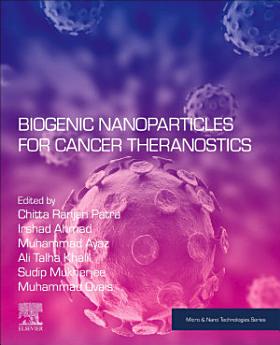Biogenic Nanoparticles for Cancer Theranostics
Über dieses E-Book
Autoren-Profil
Chittaranjan Patrareceived his B.Sc (1995) and M.Sc (1997) in Chemistry from the University of Burdwan, W.B. He was awarded the “Dr. Mrigendranath Ghosh Gold Medal for obtaining first class and first rank in B.Sc Chemistry (Hons) Examination in 1995 from The University of Burdwan, India.He completed his Ph.D. in Chemistry in 2003 as CSIR Fellow(April 1998- March 2003) fromNational Chemical Laboratory (NCL), Pune.Thereafter, he received his postdoctoral experience (March 2003-October 2004) as ‘Nanotechnologist’ from Bar-Ilan University, Ramat-Gan, Israel. After that he moved to Mayo Clinic, Department of Biochemistry and Molecular Biology in October 2004 as postdoc followed by Assistant Professor in the same Department.Here Dr. Patra explored the field of nanobiotechnology for cancer and angiogenesis. Dr. Patra moved to CSIR-IICT-Hyderabad in 2010 after receiving prestigious Ramanujan Fellowship, from DST-New Delhi. Currently, Dr. Patra is working as Principal Scientistat Department of Applied Biology, CSIR-Indian Institute of Chemical Technology (IICT) and his research group is pursuing various nanomedicine research projects aimed at developing advanced nanomaterials and nanoparticles-based drug delivery systems (DDS) for treatment of cancer, cardiovascular and ischemic disease.
Irshad Ahmad is Associate Professor of Life Sciences Department at King Fahd University of Petroleum & Minerals, Saudi Arabia. His research focuses in the area of green nanobiotechnology and cellular metabolics.
Muhammad Ayaz is a Lecturer at the Department of Pharmacy, University of Malakand, Pakistan. His research focuses on nanomaterials for drug delivery.
Ali Talha Khalil is an Assistant Professor (Molecular Biology), in the Department of Pathology, Lady Reading Hospital – Medical Teaching Institution, located in Peshawar, Pakistan. His research focuses on nanobiotechnological approaches to answer pressing challenges in health, environment and industry.
Sudip Mukherjee is a Research Fellow in Bioengineering at Rice University, USA. His research focuses on developing novel platforms of next generation therapeutics and diagnostics to improve the treatment of human diseases.
Muhammad Ovais is a Research Scientist at the CAS Key Laboratory for Biomedical Effects of Nanomaterials and Nanosafety, CAS Center of Excellence in Nanoscience, National Center for Nanoscience and Technology (NCNST), China. His research focuses on nanomedicine and cancer theranostics.Dr. Ovais received his Ph.D. with distinction from CAS Key Laboratory for Biomedical Effects of Nanomaterials and Nanosafety, National Center for Nanoscience and Technology of China. His research interests are in nanomedicines, biomaterials, immuno-engineering, and nanocatalytic medicine. He is the recipient of over 30 international awards, has authored over 50 journal articles and book chapters in journals such as Advanced Materials, NanoToday, Nanomedicine-Future Medicine, and Science China Chemistry.





